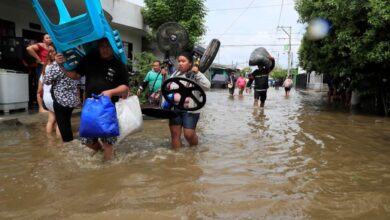The Vice-presidential Race In Colombia And Its Forgotten Black President
4 Afro candidates for the vice-presidential in Colombia revive the racist debate in the country that tried to erase its only black president from its history .

Photos: TW-FranciaMarquezM, TW-LuisGMurillo, TW-CastilloMarelen, TW-JohnMiltonR_
LatinAmerican Post | Santiago Gómez Hernández
Listen to this article
Leer en español: Carrera vicepresidencial en Colombia: Tras los pasos de Juan José Nieto Gil
Francia Márquez, Luis Gilberto Murillo, Marlene Castillo, Ceferino Mosquera Murillo and Sandra De Las Lajas Torres are 5 of the 8 vice-presidential candidates who aspire to win the next elections. Despite their high turnout, their inclusion has fueled racism on social networks. Racism in Colombia has always tried to hide in the midst of its diversity and miscegenation, but it is becoming increasingly evident.
The main target of these attacks is precisely Francia Márquez, the most surprising political phenomenon of these elections. Gustavo Petro's vice-presidential formula was the third most voted person in the March consultations and now aspires to be the first black woman to reach such a high position.
El racismo en Colombia es asqueante y en esta campaña sale a relucir con todo su odio.
Miren lo que acaba de decir paola Ochoa en blu : "Cualquier mujer se vería muy maja, muy mona y muy estrato seis al lado de Francia Márquez” pic.twitter.com/xt9cgnBFuP
— AquinoTicias (@AquinoTicias1) March 24, 2022
However, due to her inclusive language and unknown terms by the Bogota elite, this lawyer and environmental activist has been one of the most criticized candidates. But the attacks are not only against the content of her speech or her leftist proposals, in social networks, there has been racism and attacks from celebrities too.
Other racist attacks
In addition to attacks on vice presidential candidates, there were also attacks on congressional candidates. Particularly the candidate of the Community Council of Black Communities party, Fernando Ríos Hidalgo , who obtained the most votes for the special seat for Afro communities, and Miguel Polo Polo , who has received criticism and offense based on his skin color.
Polo Polo, a well-known and controversial right-wing influencer, has also been the victim of racist and homophobic attacks. And it is that being one of the few black and openly homosexual right-wing politicians makes him a unique character and even a transgressor within the Colombian political landscape.
It is true that from his speech he also attacks left-wing militants and politicians, which makes him a very controversial character. But the argument of several of the attacks against him simply demonstrates that when launching racist attacks, it does not matter if it is from the right or the left, racism is embedded in the deepest part of the Colombian imaginary and is hidden.
Juan José Nieto Gil, the president that few know
But, despite the fact that all these Afro-Colombian politicians that have been mentioned are trying to make history, there was already another black character who managed to even reach the presidency. This is Juan José Nieto Gil, until now, the first and only black president in the history of the country.
Nieto held the presidency from January 25 to July 18 in what at that time was called the Granadina Confederation, which also makes him the first Afro-president in the history of Panama (since both nations were united at that time). epoch).
You may also be interested in: The Projects That Could Be A Reality With The New Congress In Colombia
However, Nieto was never recognized as president in history, despite the fact that all his predecessors were. The Afro politician also did not have a painting in the presidential gallery of the Casa de Nariño, where all former presidents have a painting in their honor. It was only until 2018, when former president Juan Manuel Santos ordered to place his painting and recover the history of the first black president of the Andean country.
Juan José Nieto Gil. Primer presidente negro de Colombia olvidado de la historia https://t.co/wJaUs3R6gt pic.twitter.com/H2EAPoIPOY
— Historia de Colombia (@colombia_hist) October 28, 2017
However, the painting that now rests in the presidential gallery was made posthumously, and many of those paintings f Nieto Gil were sent to "whitewash" in order to hide the politician's mulatto roots.
Nieto Gil was a novelist, soldier and Governor and President of what was once the Sovereign State of Bolívar. He is considered the abolitionist of slavery on the Colombian north coast, when by means of a decree, in 1851, he eliminated such practice. In 1844, he wrote "Ingermina o la hija de Calamar", which is considered the first Colombian novel of which there is a record.




